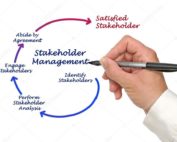Whether we like it or not, we all rely on other people to get things done, and this means that the way we interact with others has a powerful impact on how smoothly our lives run. This is particularly true when overseeing a project – the outcome will depend on the input of a diverse set of people, within our business, and externally.
Poor relationship building can lead to others blocking your progress for personal reason, despite the damage it might do on a wider scale. It’s therefore important to be able to work well with others; but understanding and building positive relationships isn’t just about people getting along and being civil to one another. It’s about creating truly collaborative partnerships that are mutually beneficial to both parties, where there is a genuine willingness to help one another without feelings of resentment. But in a society where we all feel some degree of competition with our peers, this isn’t necessarily easy to achieve. But it is possible, and all it takes is a little time to understand one another.
It Isn’t Just About You
Building our own relationships with others involved in a project is a key part of this process. But it’s also important to remember that relationships are happening all around us, and even when we’re not directly involved, the relationships that other people have with each other can impact us. Again, this is particularly prevalent in projects, as so many different individuals, teams, and departments often have to work together. While you may have a great relationship with the finance team, for example, you may find that finance and operations are often at loggerheads. This conflict could negatively impact what you are trying to achieve and put the project at risk if people are uncooperative.
In an ideal world, we’d like to think that everyone would focus on the objective at hand, but most of us know that this is rarely the case in reality. As such you may need to use your relationship skills to bridge divides between parties external to you, as well as building direct relationships, in order to get things done.
Essential elements of building positive relationships
Ask questions
Misunderstandings often arise between individuals, and impact relationships, because we interpret information based on our own frames of reference. The best way to avoid miscommunication and create clarity is by asking questions.
This is essential in the project context, as there will likely be a wide range of beliefs, perceptions, and objectives at play. Asking questions to understand these different perspectives and what people are hoping to achieve, will help avoid misunderstandings and create more unity around a specific objective.
The most important thing is never to assume you know why someone is asking for something or why they’re behaving in a certain way. There are always extraneous circumstances that you won’t be aware of, and by asking questions the risk of these getting in the way is lessened.
From a relationship building perspective, the questions don’t even have to be about a specific topic of concern. It’s equally valuable to ask people about more general things like their life outside of work, hobbies and interests. This can shed an incredible amount of light on people’s views, perceptions and ways of thinking, and also has the added benefit of showing you are interested, which instantly creates a stronger bond between individuals.
However, if you are building relationships in order to benefit your project, it is also important to address the relevant topics, such as expectations, assumptions, and objectives.
Listen
It’s one thing to ask questions, it’s another thing entirely, to actively listen to the answers.
People often assume listening is about hearing the words that a person says, but it’s actually more than that. It’s also about being aware of their tone of voice and their body language, along with the words they say. All this combined is what tells the real story behind what someone is trying to say.
When you’re interacting with others, make sure you take time to consider all of these things, and don’t use every interaction simply as a platform for you to say your piece. Being listened to is a very powerful thing and can forge truly strong connections.
Reflect on your own behaviour
A common barrier to developing positive relationships is recognising the impact of your own behaviour. Everybody is different, and we all express ourselves in distinct ways; but to create more fulfilling relationships with others, it’s vital that we can adapt our behaviour when needed.
Some individuals, for example, may be highly confident in themselves and very comfortable expressing themselves to others. However, others may be more reserved, and need to be encouraged to speak up. Equally, your direct approach may work well with certain team members, while others could feel intimidated, and consequently fail to perform at their best. It’s valuable to acknowledge these differences, and where possible, adapt your behaviour accommodate the preferences of others.
The ability to demonstrate self-awareness and self-control is essential in effective relationship building, as it also demonstrates your consideration of others. Gathering feedback is key to developing self-awareness; understanding how others interpret your behaviour can offer highly valuable insights and if several people tell you the same thing, perhaps there’s a grain of truth to it. This is certainly not to say individuals need to change who they are fundamentally, but being able to adapt to different situations and be considerate of other people’s views will help make them feel more comfortable and as a result, allows for more meaningful interactions.
Tools such as psychometrics can be useful in revealing these details, and help individuals and teams understand one another better.
Express your thanks
Praise and recognition are highly important when building positive relationships; people love to receive praise as it reaffirms that what they did was good enough and valuable.
In a project environment as you actively rely on the good work and input of others, so they need to feel valued. When you regularly thank people for their hard work, and state the positive impact it had, they are more likely to make that same effort in the future.
Praise and recognition should be given freely across the project team. And it is just important for those who only play a relatively minor role in a project, as it is for those who are involved day to day.
Working to build positive relationships with others is essential when managing a project – you can’t succeed without the input of others, and having strong relationships not only make chances of success higher, it also makes the project experience more enjoyable.
Many of us already do the things above within the context of our personal lives, so it’s about learning to transfer that to the workplace, and where necessary developing the areas we may be lacking in. Doing so will make all elements of your interactions much more pleasant, and even delivering bad news or providing negative feedback will become a more constructive process if it is occurring within the context of an existing positive relationship. It also helps contribute to greater collaboration, better innovation, improved productivity and overall employee well-being. Our relationships are an essential part of how we function as human beings, so it’s important we make them as positive as possible.
Read Next
How to Build and Maintain Digital Trust
Building trust, and specifically digital trust, has been an ongoing challenge for many organisations. In certain companies, employees feel like they are not trusted, as highlighted by the historic reluctance of some organisations to [...]
Cracking the Code of High Performing Teams
Teams fascinate me. We are all part of a team in some form or another. In his book ‘The One Minute Manager Builds High Performing Teams’ Ken Blanchard states that ’50 to 90% of [...]
Interchangeable Leadership – The Leader is the One with the Ball
Think of a leader. What comes to mind? Perhaps it’s an image of a man or woman in an expensive suit delivering a presentation or commanding a room. You probably don’t think of a muscular man [...]
Four Top Tips for Successful Communication
Understanding Communication skills Whether we like it or not communication is part of our lives, it’s the linchpin of our society, and yet despite its immense importance, it’s astounding how often people get it [...]
Conflict Management, Collaboration and Teamwork – Lessons from Space
Throughout history there have been many examples of unexpected partnerships emerging and powerful demonstrations of teamwork, but arguably none more inspiring than the formidable task of setting up and maintaining the largest man-made satellite [...]
Four Steps to Effective Stakeholder Management
One of the most important skills required for project success is good stakeholder management. There can be so many stakeholders involved that identifying them and their influence on a project can make a marked [...]






